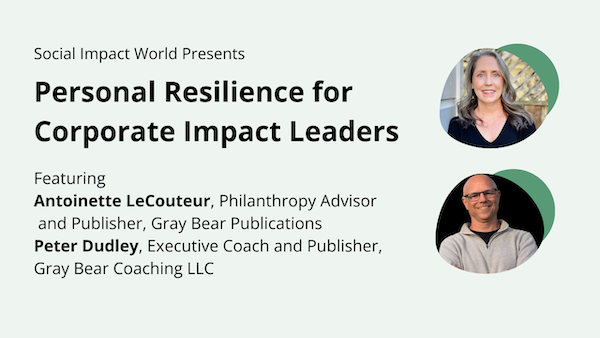Social impact: the inspiration and exhaustion
I’m writing for social impact professionals today, but this is relevant for everyone who cares about something, or who wants to improve the world even just a little bit.
I spent 20 years as a social impact program manager and executive, on both the funding and the impact side. I know how inspiring the work is and how wonderful the people are. I also know the frustrations, challenges, insecurity, and exhaustion that plague those wonderful people.
That exhaustion is one of the reasons I published Relit: How to Rekindle Yourself in the Darkness of Compassion Fatigue. I’ve felt it. I’ve seen it nearly destroy good people.
But it doesn’t have to. Come to my free webinar this Wednesday, put on by Social Impact World, and get practical, relevant advice and stories about personal resilience.
WHEN: Wednesday, June 11 at 2 p.m. Eastern / 11 a.m. Pacific
TITLE: Personal Resilience for Corporate Impact Leaders
Sign up for free here.
Bonus gift for attendees
I’ll offer attendees not just a free coaching session with me but also a free session for their boss. Because that’s who really needs coaching, amirite?
Social Impact: inspiration
The thing I miss most about being in a corporate social impact role is attending gatherings of other social impact professionals. Talk about inspiring, fun, smart people with solid value systems.
Many of the people I used to see at those gatherings I still consider lifelong friends. I see their posts on LinkedIn and get serious FOMO during conference season.
I don’t miss the social impact part of it, though, because the reality is that anyone, anywhere, in any job can do their part to make the world better. I donate my money, I donate my time (in fact, I’m doing several pro bono sessions this week for the University of California system), I donate my knowledge and wisdom, and I advocate for things I care about.
A lot of people get into social impact so they can work on systems transformation. I got into coaching so I can work on individual transformation. The more social impact leaders I can help get to peak performance, and the more social impact teams I can turn from dysfunction to empowerment, the more my own effort is multiplied.
Social Impact: exhaustion
To succeed in a social impact role—-just to persevere—-requires tremendous personal resilience. Add to that the fact that many people in social impact are also the caregivers in their own families and personally involved in their communities, and things can quickly tip from exhaustion to overwhelm to burnout.
Some of the things social impact professionals deal with that many people don’t expect are
- Having to say “no” all the time
People think social impact professionals mostly give away money, but really they spend more time saying no. There’s far more need than any program can fund, and every cause is important. The weight of all those “no”s add up. - Budget cuts
I spoke with one friend last week who said their grant budget was cut due to the economy. Just when need is growing, their ability to fund solutions is being limited even more. - Staffing cuts
Social impact roles are often among the first to be shaved off when a company hits a bad period. That creates insecurity and uncertainty, but it also creates a constant “do more with less” scarcity mindset with those who still have to get the job done. - Disempowerment
Most people think the best way to change the world is to work in corporate social impact, but the reality is that those roles often have little actual power. The business leaders still pull the strings, control the budgets, and make baffling and frustrating decisions. Often, they don’t understand the role or its nuances, treating social impact as either their personal charity checkbook or a virtue-washing tool. - Disaster response
Social impact roles are usually part of any company’s disaster response. With multiple global crises going on right now and increased natural disasters, it can feel like you’re being tossed from one crisis to another. Exhausting and unsustainable. - Being the public cheerleader
I’ll never forget in 2008 when my colleague was speaking on a panel at a conference, talking about Wells Fargo’s volunteer sabbatical program, and someone in the audience asked how we could possibly say the company did anything good in the middle of the subprime mortgage fiasco. Years later, I left Wells Fargo in part because of the cognitive dissonance created by trying to run employee engagement programs in a company mired in ethical scandal. All companies are complicated, and being the mouthpiece for the good side of the company puts you in the crosshairs of anyone with an axe to grind.
Solutions to these social impact problems
Ha, ha! You thought I would have solutions to thse things? There really aren’t any. Those are things that are unlikely to change. They are all realities that will probably exist forever and for all time, barring the total collapse of capitalism. Which would be a different problem.
A lot of social impact professionals hope for better days ahead. Days when it will be less exhausting. Days when there are no disasters to respond to, no executives demanding meaningless reports, no budget constraints, no personal traumas at home to use up whatever personal time they might have to refuel and recharge.
There’s hope that something else will change to make the job less exhausting. The reality is, however, that the power to make things change is internal, and the way to tap into that is to build up a robust tool kit for personal resilience.
This isn’t just about getting better at enduring unendurable situations. It’s about self-actualizing, finding your own empowerment, setting and maintaining boundaries, communicating clearly and powerfully, carrying with executive presence, taking control of your inner saboteurs, and ditching unhealthy perspectives.
Come to the webinar
That’s way more than we can cover in a short webinar, even with Q & A. But you should come anyway.
You might also consider buying the book RELIT. There’s a lot to learn, contemplate, and be inspired by between its pages. If you’ve already read it, please let me know what you thought. The webinar will be a small subset of what’s in the book.
Get your boss a free coaching session
Whether you’re in a social impact role or not, everyone can benefit from coaching. Your boss most of all. (Believe me, I know. I was the boss for a lot of my career. I could have been so much better if I hadn’t had to figure it all out for myself.)
Email me or set up a time to chat, or just forward this post to your boss so they can connect with me directly. I guarantee it’ll be worth the time for all of us.
Download my chapter from RELIT

RELIT: How to Rekindle Yourself in the Darkness of Compassion Fatigue gives practical, relevant, actionable advice on avoiding and overcoming compassion fatigue and caregiver burnout. As a professional coach, I have to pay close attention to self-regulation and my own personal resilience. My chapter explains the things I do to stay centered and stay focused so I can give every client my best, every time.
Download my chapter for free: Show up. Try hard. Be nice.
Or just go buy the whole book. It’s worth it.



